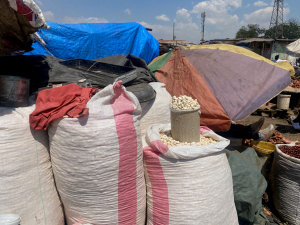Although colonial legacies continue to shape the way Africans produce and consume food, African territorial markets are quietly re-defining post-colonial consumption patterns by positioning agroecology and indigenous food systems. This process is also providing alternatives for heathy-conscious citizens keen to de-link local food systems from Western five course meals.

Against all odds such as rapid rural urbanization, African territorial food markets continue to silently dismantle the dominance of Western food and formal marketing systems that have traditionally influenced what the majority of urban consumers eat for breakfast, lunch and dinner. Breakfast is no longer defined by wheat bread thanks to several menus like boiled sweet potatoes, roasted nuts, mopani worms and many other variations of fruits that happen to be in season. By providing space for diverse indigenous and local foods, territorial markets are protecting markets from corporate capture. These markets are also building a resilient Africanist market narrative and decolonizing the formal marketing theory through knitting together food, culture and identity.
Clarifying invisible supply chains
To an outsider, territorial markets may seem chaotic but they have unique ways of clearly defining supply chains for different commodities from production to household kitchens, restaurants and hotels. For each commodity found in the market, sources, distribution pathways and quantities per given time are carefully matched with demand in ways that avert losses. Each commodity has its own specialists who influence how it is produced, packaged, transported and big bulks are broken into different sizes in line with different buying powers of diverse consumers. The same way industrial agriculture has continued to promote hybrids and exotic food is being copied and improved by traders of indigenous food. For instance, where industrial systems insist on using weighing scales, traders know that scales are not the best way of valuing indigenous food grown without chemicals because such food is not too heavy but nutritionally-packaged by Mother Nature.
Creating space for agroecology
Whereas some people think organic and agroecologically grown commodities should have their own separate market, territorial market actors think these commodities can prove themselves in a competitive market landscape where consumers can actually see what is organic or agroecologically grown from what is produced using industrial means. Unless consumers are exposed to what is available on the market, it becomes difficult for them to see and appreciate the differences. Likewise, on the production side, farmers have to choose between mono cropping and growing diverse commodities that have several nutrition advantages not just yield per hectare. Territorial markets empower agroecology farmers to explain competitive advantages of food diversity. These markets also provide advantages for farmers interested in capitalizing on suitable climatic conditions to focus on a few agroecology commodities like forestry or natural herbal commodities that lend themselves to aggregation for several niche markets.
Modelling and commercializing smallholder production
Based on demand patterns and feedback from territorial markets, farming communities are learning about appropriate ways of modelling and commercializing their collective food production. For instance, in pursuing agroecology some communities are beginning to imagine how they can use the little rainfall they receive annually to promote food diversity. This is how they decide to build business models around selected agroecological economic drivers such as groundnuts, Bambara nuts, traditional grains and small livestock that thrive under water-stressed conditions.
Many development organizations promote small livestock and small grains in the name of building resilience yet communities in dry regions have been driving their sustenance from their own value chains which corporate agriculture has been trying to infiltrate and destroy. In some communities, government is seen rehabilitating irrigation systems for industrial crops. However, supporting one crop like sugar cane or wheat under irrigation creates competition for labour as energetic youths end up going to work in irrigation schemes and neglect their local food systems. Instead of conducting maize, wheat and sugar cane trials in irrigation systems in dry regions, trials should focus more on indigenous commodities that grow naturally in these regions. Eventually, irrigation schemes can develop the naturality required by indigenous crops and forests.
When governments fully embrace agroecology, irrigation schemes will be designed to navigate communities the way roads move around communities. That way, some of the water irrigation water will flowi into pastures and forests for the benefit of wild life, natural fruits and forests whose products are now largely demanded in African territorial markets. It also becomes possible for agroecology to ride on existing natural ecosystems. Communities already have enough knowledge which if retained in line with the agroecology principle of co-creating knowledge can lead to resilience. Territorial markets are showing enormous potential for using Indigenous Knowledge Systems (IKS) to drive community sustenance against imported knowledge which drives imported food and western markets.
From a commercial exercise to a spiritual enterprise
If all traders in African territorial markets were motivated by money, no trader would specialize in small movers like traditional grains and natural herbs. Everyone would be trading necessities and fast movers like vegetables, tomatoes and potatoes. Instead, what makes territorial markets different from any other market is that some traders take their work as a spiritual enterprise not just a commercial venture. These traders have been cultured to see the spiritual value of indigenous food which cannot be fully expressed in dollars and cents. For these traders, the market is not just for earning cash but also distributing rich streams of value through extraordinary indigenous food products whose production and preservation knowledge has been passed from one cultural generation to the other. By holding and trading indigenous food, these traders use territorial markets as channels of increasing consumer intimacy with the soils and water used to produce these sacred commodities. The presence of sacred commodities in territorial markets show these markets’ unique contribution to upgrading the world through healthy and culturally appropriate food.
Charles@knowledgetransafrica.com / charles@emkambo.co.zw /
Website: www.emkambo.co.zw / www.knowledgetransafrica.com
Mobile: 0772 137 717/ 0774 430 309/ 0712 737 430
